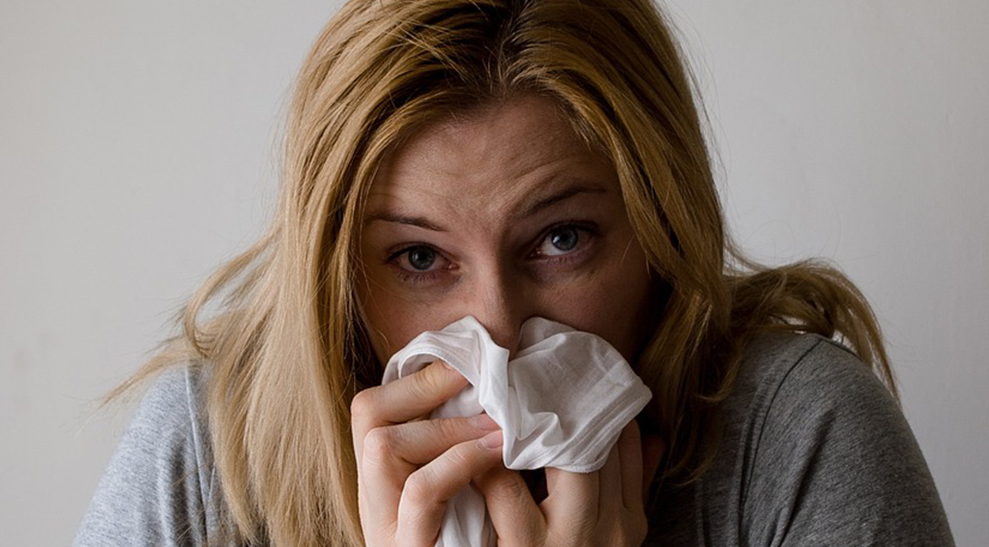How To Get Over Freshers' Flu (Or Avoid It!)
If you want to keep away from the perils of freshers' flu have a look at our tips...
With all that socialising and partying when you get to university, unfortunately there's a high chance freshers' flu is coming your way!
The reason for this is simply that large numbers of people from all over the place will carry pathogens to which they are immune, but you aren’t yet.
You've probably heard of the notorious illness, which can leave you feeling very worse for wear.
Here, we'll take a look at what exactly freshers' flu is, how long it typically lasts, how you can try to avoid it and how to recover from it, as well as quickly highlighting the differences between freshers' flu and other, more serious illnesses such as meningitis or Covid-19.

What is Freshers' Flu?
Freshers' flu - despite the name - isn't actually flu. It's more of a cold, but 'fresher's cold' just doesn't quite have the same ring to it, does it?
Unfortunately, this doesn't make it any more pleasant than the flu.
This dreaded bug can really wipe you out, leaving you feeling groggy, potentially a little feverish with a sore throat and may even give you a nice headache while it's there.
It tends to strike students at a time when they're mingling with lots of new people, getting very little sleep, and placing the body under general strain through things like drinking alcohol and adapting to a new routine.
It might feel like the end of the world at the time but don't worry! If you want some helpful tips on how to get over freshers' flu or hopefully avoid it in the first place, we've got you.

How Long Does Freshers' Flu Last?
For some, freshers' flu will (thankfully) be over in a matter of days, while others are left feeling under the weather for closer to a few weeks.
It all depends on the individual, but if your symptoms last any longer than this we'd probably advise visiting your GP just to be on the safe side and to rule out any other possible illnesses!
How To Avoid Freshers' Flu
The question students across the country search online at this very time of year, each year.
It goes without saying that nobody wants to feel unwell at a time when you should be mingling with new people, getting to know your new home and starting your studies. So is it possible to avoid catching the dreaded freshers' flu?
Well, there are certainly precautions you can take and ways you can boost your immune system.

As explained by Push Doctor, freshers' flu (as with most viruses) is generally spread in two ways: either via person-to-person contact (whether that's a hug, a kiss, a handshake, or being in close proximity to an infected person), or through touching an infected surface (anything from door handles to leaflets and kitchen countertops).
As you can imagine, this makes it quite difficult to avoid at a time when so many new people are in one place. However, here are some quick recommendations that may just help you to dodge it:
Make sure you and your flatmates are practicing good hygiene - yes, Covid has reinforced the importance of washing those hands properly and frequently, so keep it up!
Take a daily multivitamin or eat foods rich in vitamin C such as oranges, strawberries, tomatoes, broccoli etc. Remember, as a TOTUM member you can get an impressive 10% off at Boots when stocking up on those vitamins - it's a no brainer!
How to Get Over Freshers' Flu
Now we're onto the main event - how to get over freshers' flu once it's hit.
If you're currently reading this whilst moping about in your room feeling poorly, you have our sympathy and we're here to get you on the mend. Here are our top tips for getting over freshers' flu...
Drink plenty of water

Drinking too much alcohol will weaken your immune system which is there to keep away all those nasty viruses.
Keep hydrated to make sure you're flushing out all potential freshers' flu toxins and keep that skin of yours glowing.
Eat Healthily

We don't mean to sound like your parents but... EAT YOUR FRUIT AND VEG! Nights out, for most of us, will inevitably end with a takeaway (hello Deliveroo student discount...) but don't let this be your main source of nutrition!
It really will only end up making you feel a whole lot worse in the long run. Give your body a chance to defend itself (or recover in this case) and eat some decent food - again, we'd recommend eating plenty of fruit and veg that are sources of vitamin C.
Stay hygienic

Being around a lot of people means coming into contact with lots of germs. Don't be afraid to whip out the anti-bac, have a quick shower after a night out and of course - wash your hands!
Don't overdo it

Everybody's different - just because your new flatmate can go out every night during Freshers' Week it doesn't mean you should try and keep up.
If you're feeling like you've had enough for one evening maybe it's time to go home and have a lie down.
Having a good rest is the key to feeling great! You should aim for at least seven to eight hours of sleep to fully recharge. Lack of sleep can not only lead to a weakened immune system in the first place, it can also make it more difficult to recover from illnesses once they strike.
Make sure you're up to date with vaccinations

Chances are your freshers' flu is just the common cold, but it could be something worse.
Meningitis is linked to university students living halls of residence as its symptoms can be confused with a stomach bug or hangover!
You can find all the advice you need including how to recognise meningitis - and what to do if you think you or one of your friends is displaying symptoms on the NHS website here.
What's more, it's important to test for Covid if you begin to suffer some classic cold or flu-like symptoms to rule this out where possible - a lot of the symptoms may overlap.
As advised on the government's Education Hub, if you have a temperature, a continuous cough, experience sneezing fits, feel sick or have diarrhoea, you should avoid close contact with other people and contact your GP.
Which brings us onto our final point - it's important that you register with a new GP when you arrive at uni, so take half an hour out of one of your first few days to work out where your nearest doctors’ surgery is and get yourself signed up - it’ll make things so much easier when you’re feeling under the weather and you don't want to wait to register until you're already unwell!
Join the TOTUM club!
Join TOTUM Student for FREE to access hundreds of student discounts on big-name brands like ASOS, Apple, MyProtein, boohoo, Samsung, and more!
Sign up for FREE, download the TOTUM app, and enjoy the latest offers, vouchers, coupons and more at your fingertips. Find out more.
Download The TOTUM App

Stories like this

Having To 'Fake Smile' At Work Could Lead To Heavy Drinking, Reveals Study
The study concluded that employees who forced themselves to smile and portray false emotions in front of customers were more likely to engage in heavy drinking after work.

One 'Lazy Day' A Week Can Help Reduce Stress, High Blood Pressure And Improve Mental Health
Just one lazy day a week can actually boost your productivity, happiness and well-being, work wonders for your mental health and even reduce stress and high blood pressure!

This Trick Saves You Over £130 On Your Boots Shopping
What if we told you that you could save over £130 on your Boots shopping? That's easily enough to really treat yourself to some new festive fits when Christmas rolls around!







